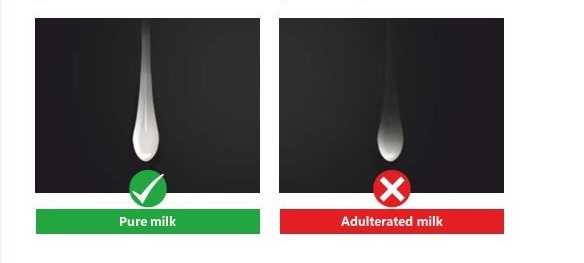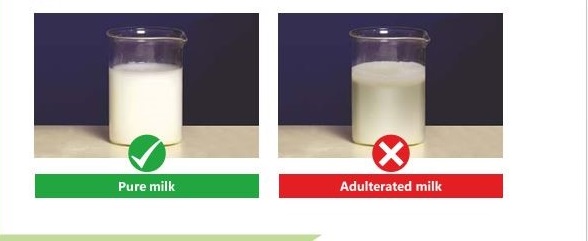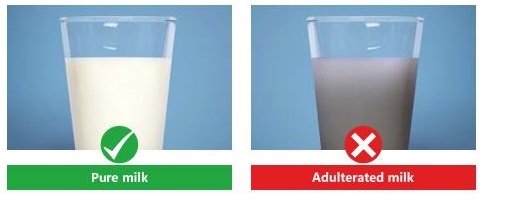FSSAI (Food Safety and Standard Authority Of India) is an autonomous body established under the Ministry of Health & Family Welfare, G. FSSAI is responsible for protecting and promoting public health through regulation and supervision of food safety.
FSSAI conducts testing of food for a different type of adulterants, chemical contaminants and other safety parakeets of food.
They have given some quick tests for some adulterants in food and milk.
For Milk some test is as follows:
Detection of water in milk Testing Method:
- Put a drop of milk on a polished slanting surface.
- Pure milk either stays or flows slowly leaving a white trail behind.
- Milk adulterated with water will flow immediately without leaving a mark.

Detection of detergent in milk Testing Method:
- Take 5 to 10 ml sample with an equal amount of water.
- Shake the contents thoroughly.
- If milk is adulterated with detergent, it forms a dense layer.
- Pure milk will form a very thin form layer due to agitation.

Detection of Starch in milk and milk product(Khoya, Chenna, Panner)
Testing Method:
- Boil 2-3 ml of sample with 5 ml of water.
- Cool and add 2-3 drops of tincture of iodine.
- Formation of blue color indicates the presence of starch. (In case of milk, the addition of water and boiling is not required).

Detection of mashed potatoes, sweet potatoes and other starches in ghee/butter
Testing Method:
- Take a ½ teaspoon of ghee/butter in a transparent glass bowl.
- Add 2-3 drops of tincture of iodine.
- Formation of blue color indicates the presence of mashed potatoes, sweet potatoes, and other starches.

We at Puresh daily want to go one step further. We not only ensure that milk is pure and hygienic, but we ensure that it is organic in nature. By organic, we mean that no chemical is used in the entire chain of milk production.
We also have an App that enables consumers in managing subscriptions, payments, cancellation, change in quantity, wallets, offers, and schemes, etc.
We at Puresh Daily, www.pureshmilk.com, are on a mission of #MakingRanchiHealthier.



Comments
Philosophy is the discipline that studies major and universal questions, such as existence, cognition, values, mind, and language. It encompasses many subjects and issues, from ethics and politicians to metaphysics and logic. Here are principal nuances of philosophy:
1. Definition of Philosophy
Philosophy comes from the Greek words “philos” (love) and “sophia” (wisdom). It is the desire to realize and make sense of the world around us and our place in it.
2. The Main branches of philosophy
– Ontology research of the essence of being and existence.
– Epistemology the study of the nature and limits of knowledge.
– Ethics the analysis of ethical principles and concepts of good deed and evil.
– Logic research of the forms and principles of correct thinking.
– Political philosophy the study of questions of power, justice and the state.
3. Eminent Philosophers
During the history of philosophy, many thinkers have made significant contributions to this science. Some of the most famous include:
– Socrates, considered the founder of Western philosophy.
– Plato, a pupil of Socrates, developed the doctrine of forms.
– Aristotle, the creator of logic and a large number of scientific fields.
– Immanuel Kant, known for his own [url=https://thephilosopher.net/miller/]Henry Miller[/url] critical philosophy and work on moral issues.
4. The Relevance of Philosophy in the Modern World
Philosophy remains relevant in the modern world since enables people to understand complex social and moral issues, but also develops critical thinking. It influences the legal system, politicians, and various fields of science.
5. Practical Applications of Philosophy
Philosophical ideas penetrate daily life. Ethical reflection helps people do the correct thing in difficult situations, and philosophical analysis contributes to most excellent understanding of issues related to technology, art, and social justice.
Philosophy is not only an academic discipline, as well as method of thinking that helps us to understand life’s complexities and make informed choices.
Philosophy is the discipline that studies fundamental and universal questions, such as existence, cognition, values, mind, and language. It encompasses a vast number of topics and problems, from ethics and politicians to metaphysics and logic. Here are principal nuances of philosophy:
1. Definition of Philosophy
Philosophy comes from the Greek words “philos” (love) and “sophia” (wisdom). It is the desire to realize and make sense of the world around us and our place in it.
2. The Main branches of philosophy
– Ontology research of the essence of being and existence.
– Epistemology the study of the nature and limits of cognition.
– Ethics the analysis of ethical principles and concepts of good deed and evil.
– Logic the study of the forms and principles of correct thinking.
– Political philosophy the study of questions of power, justice and the state.
3. Famous Philosophers
Throughout the history of philosophy, many thinkers have made meaningful contributions to this science. Some of the most famous include:
– Socrates, considered the founder of Western philosophy.
– Plato, a student of Socrates, developed the doctrine of forms.
– Aristotle, the creator of logic and many of scientific fields.
– Immanuel Kant, known for his Marcel Proust critical philosophy and work on moral issues.
4. The Relevance of Philosophy in the Modern World
Philosophy remains urgent in the modern world since it helps people to understand difficult social and moral issues, also develops critical thinking. It influences the legal system, politicians, and various fields of science.
5. Practical Applications of Philosophy
Philosophical ideas enter daily life. Ethical reflection helps people do the correct thing in difficult situations, and philosophical analysis contributes to most excellent understanding of issues related to technology, art, and social justice.
Philosophy is not only an academic discipline, as well as a way of thinking that helps us to understand life’s complexities and make informed choices.
Philosophy is the discipline that studies major and universal questions, including existence, cognition, values, reason, and language. It encompasses many topics and problems, ranging from ethics and politicians to metaphysics and logic. Here are the main aspects of philosophy:
1. Definition of Philosophy
Philosophy comes from the Greek words “philos” (love) and “sophia” (wisdom). It is zeal to realize and make sense of the world around us and our place in it.
2. The Main branches of philosophy
– Ontology the study of the essence of being and existence.
– Epistemology the study of the nature and limits of knowledge.
– Ethics the analysis of moral principles and concepts of good deed and evil.
– Logic research of the forms and principles of correct thinking.
– Political philosophy the study of questions of power, justice and the state.
3. Notable Philosophers
Throughout the history of philosophy, many thinkers have made meaningful contributions to this science. Some of the most famous include:
– Socrates, considered the progenitor of Western philosophy.
– Plato, a student of Socrates, developed the doctrine of forms.
– Aristotle, the creator of logic and many of scientific fields.
– Immanuel Kant, known for his [url=https://thephilosopher.net/joyce/]James Joyce[/url] critical philosophy and work on moral issues.
4. The Relevance of Philosophy in the Modern World
Philosophy remains urgent in the modern world because it helps people to understand complex social and moral issues, and also develops critical thinking. It affects the legal system, politicians, and various fields of science.
5. Practical Applications of Philosophy
Philosophical ideas penetrate daily life. Ethical reflection helps people do the right thing in difficult situations, and philosophical analysis contributes to better understanding of issues related to technology, art, and social justice.
Philosophy is not only an academic discipline, yes and method of thinking that helps us to understand life’s complexities and make informed choices.